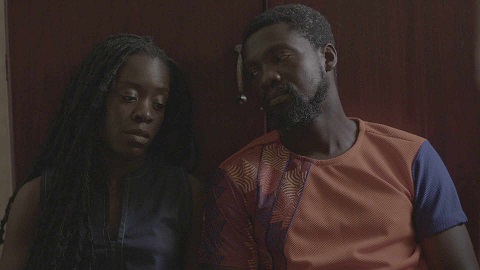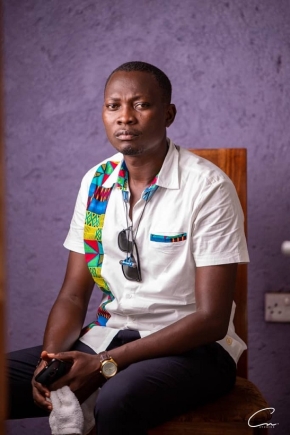![]()

Crossing the Blue Lagoon Street
THE haunting chorus from Amakye Dede's classic hit, 'To Be A Man' - "To be a man na wah oooo to be a man na wah ooooo…" certainly sits deeply with many men who watch the movie, Blue Lagoon Street.
It's no coincidence that Amakye Dede penned these lyrics after his own struggles in Nigeria in the 1980s, where he faced the burden of providing for himself and others.
This universal struggle of men working tirelessly to put food on the table and support their families is captured in Oliver Quansah's new short film, Blue Lagoon Street.
Writer and movie producer Oliver Quansah shows an example of how cinema can be utilised as a powerful tool to highlight pressing issues in society.
The thought-provoking 25-minute film delves into the struggles of modern life, particularly the weight of responsibility on men who are the primary breadwinners of their families.
The movie tells the story of John Yeboah, a young devoted husband and father who loses his job but is unable to muster the courage to inform his wife, Abena.
As the days turn into weeks, and the weeks into months, John's deception takes a toll on his marriage and self-esteem since he couldn’t provide for his young family.
His daily routine of leaving home to wander the streets of Accra, returning empty-handed, showed the emotional emptiness and desperation that can accompany unemployment.
The film's theme of responsibility is brought to the fore throughout the narrative, highlighting the pressures and expectations placed on individuals to provide for their loved ones.
On the other hand, John's friend, James, serves as a voice of reason, urging him to be honest with Abena, but John's fear of failure and rejection holds him back.
One of the most striking aspects of Blue Lagoon Street is its focus on the societal expectations placed on men to be providers.
Out of frustration, John's question to Abena, “Am I responsible for your pregnancy?” is a tough moment that highlights the emotional burden of responsibility and the fear of not meeting up to his expectations loudly heard in his voice.
In recent years, filmmakers have been using their platforms to tackle some of the most pressing issues of our time.
From social justice and inequality to mental health and environmental concerns, movies have become a powerful tool for sparking crucial conversations and inspiring change.
Burden on men
In an interview with Daily Graphic, Oliver Quansah said the movie shed light on the often-overlooked consequences of unemployment and the societal expectations placed on men to provide for their families as the head.
“Blue Lagoon Street is an almost true story and I want to draw society’s attention to the mental torture of many who are silently dying under the weight of responsibilities.
“Movies such as 12 Years a Slave, An Inconvenient Truth, and Before the Flood have addressed very pertinent issues in society.
“And I’m hoping that Blue Lagoon Street will equally start a conversation on the role of men and husbands in our society,” he said.

Oliver Quansah is a graduate of the National Film and Television Institute (NAFTI) with over 10 years of experience in the film industry in Accra, Ghana.
He has written and directed four short films namely Page 22, Call The Police, Sea & Fish and Blue Lagoon Street, which premiered in 2023 at the 12th edition of Luxor African Film Festival in Egypt and screened at Festival del Cinema di Cefalu in Italy.
Oliver, who is a member of the Ghana Academy of Film and Television Arts, (GAFTA), told Daily Graphic he was preparing for his debut feature film titled, Memoirs.
During the interview, Oliver Quansah also made a passionate plea to the film industry to give young and up-and-coming talents a chance to shine.
He explained that the industry's reliance on established faces was stifling creativity and hindering growth.
“We can't keep relying on the same old faces. There's a wealth of young talent out there with fresh ideas and energy. It's time we give them a platform to showcase their skills.
“Kobina Amissah Sam and Diella Abena Dufie Ocran who played the lead roles of John Yeboah and Abena Duncan delivered their characters well,” he stated.
Oliver argued that the industry's failure to nurture young talent was leading to a stagnation of ideas and a disconnection from the younger generation.
“We need to tap into the creativity and passion of young people to stay relevant and push the boundaries of storytelling," he stated.
